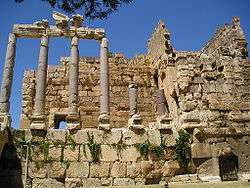Propylaea
In ancient Greek architecture, a propylaea, propylea or propylaia (/ˌprɒpɪˈliːə/; Greek: προπύλαια) is a monumental gateway. The prototypical Greek example is the propylaea that serves as the entrance to the Acropolis of Athens. The Greek Revival Brandenburg Gate of Berlin and the Propylaea in Munich both evoke the central portion of the Athens propylaea.
.jpg)

Etymology
The Greek word προπύλαιον propylaeon (propylaeum is the Latin version) is the union of the prefix προ- pro-, "before, in front of" plus the plural of πύλη pyle "gate," meaning literally "that which is before the gates," but the word has come to mean simply "gate building."
Propylaea of the Athenian Acropolis
The Propylaea was the monumental gateway to the Acropolis commissioned by the Athenian leader Pericles in order to rebuild the Acropolis at the conclusion of the Persian Wars.
Propylaea outside the Greco-Roman world
The oldest known freestanding propylaeum is the one located at the palace area in Pasargadae, an Achaemenid capital.[1]
A covered passage, called "the Propylaeum", used to face the Palace of Darius at Susa.[2]
Notes
- electricpulp.com. "PASARGADAE – Encyclopaedia Iranica". www.iranicaonline.org. Retrieved 23 April 2018.
- "SUSA iii. THE ACHAEMENID PERIOD – Encyclopaedia Iranica". iranicaonline.org. Retrieved 2017-07-11.
References
- Berve, H.; Gruben, G.; and Hirmer, M. Greek Temples, Theaters, and Shrines (New York, 1963). A general look at selected Greek structures.
- Dinsmoor, William Bell (1922), "Structural Iron in Greek Architecture," American Journal of Archaeology, XXVI
- Dinsmoor, W. B., The Architecture of Ancient Greece (New York, 1975 - but actually a reprint of the 1950 publication). A general book on Greek architecture; dated in many areas but valuable for the Propylaea.
- Dinsmoor, W. B., Jr., The Propylaia I: The Predecessors (Princeton, 1980). A careful study of the predecessors of the Propylaea.
- Eiteljorg, Harrison, II, The Entrance to the Acropolis Before Mnesicles (Dubuque, 1993). A careful study of the predecessors of the Propylaea, with very different conclusions from those of Dinsmoor above.
- Lawrence, A. W., Greek Architecture (Baltimore, 1973). A general book on Greek architecture.
- Robertson, D.S. Greek and Roman Architecture' (Cambridge, 1969). A general book on Greek and Roman architecture. Available in paper, this may be the best place to begin for those with no knowledge of ancient architecture.
- Travlos, J., Pictorial Dictionary of Ancient Athens (London, 1971). An encyclopedic approach to the monuments of Athens.
- The Perseus Project An electronic resource that provides quick information, but some of the information about the Propylaea was incorrect when the site was last checked. Several good photographs of the Propylaea are available through the Perseus project.
External links
| Wikimedia Commons has media related to Propylaea. |
- Propylaea.org – leads to a variety of material, some scholarly, but many photographs as well